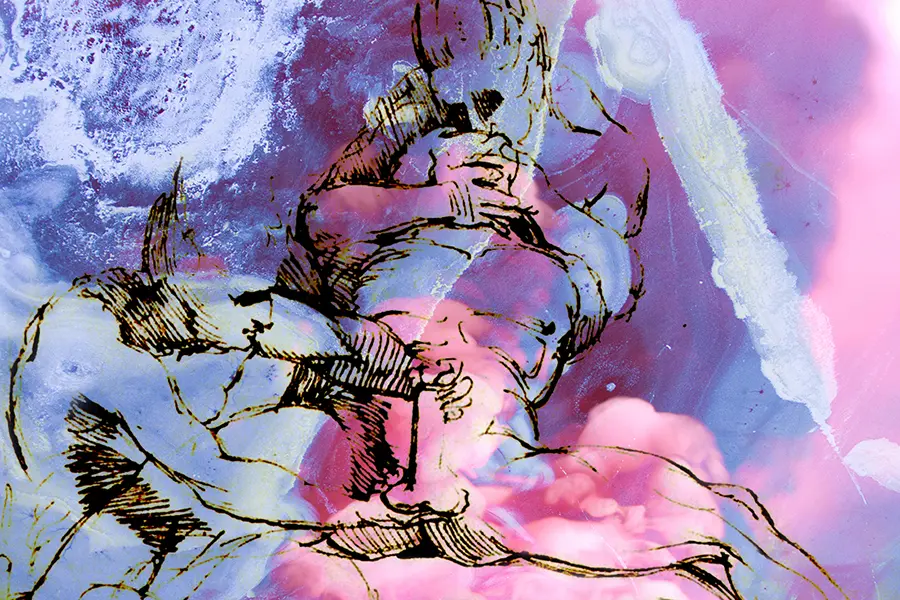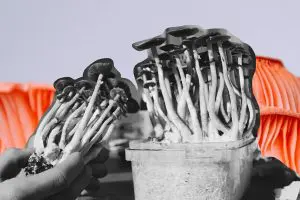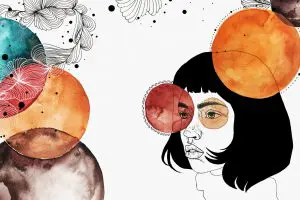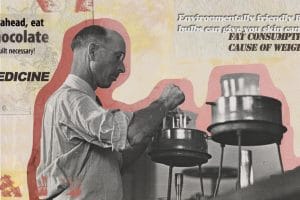Is our capacity to be loved equal to our capacity to give it? In recent years, the public’s trust in long-held ideologies like monogamy and the institution of marriage has begun to erode. Many have questioned why it is that you must dedicate your body to one person for life, and why love is considered to be such a narrow aisle.
As society develops a deeper understanding of reality’s subjective nature, we’re seeing more open attitudes toward plant medicine as a healing modality and tool for expanding consciousness. Based on my own conversations and observations, I’ve come to recognize that we’re in the midst of a quiet revolution in which people are questioning the ways we’ve been told life is supposed to be. The potential long-term positive impact of responsible psychedelic use (including therapeutic practices or ceremonies that promote unity and interconnectedness) enables people to transcend their usual patterns of behavior and to subsequently challenge previous reservations or beliefs about relationships.
Responsible psychedelic use enables people to transcend their usual patterns of behavior and to subsequently challenge previous reservations or beliefs about relationships.
When we experience in an altered state the true depth of our capacity to love, and then return to a world that continues to preach its limitations, it’s difficult not to feel duped. A threesome, or any polyamorous relationship that involves more than two people may be considered, by traditional standards, to be a threat to a legitimate partnership.
Polyamory or ethical non-monogamy is often characterized by a primary couple that openly (and with mutual consent) engages with other romantic partners individually or as a couple. This form of bonding is becoming a viable, fulfilling, and increasingly popular lifestyle option, in which the fundamental philosophy is that love shouldn’t be confined to monogamy, but expressed freely and fully. Here, honesty, rather than repression, is the antidote to the human drama of infidelity.
“If you contrast the free love movement of the 60s, we think people were in an expressive, expansive mode, but that time is still marked with patriarchal and misogynistic conventions,” says Dee Dee Goldpaugh, a psychotherapist specializing in sexuality and plant medicine integration. “I believe we are sexually liberated in a different way today because we have a better sense of consent. People’s sexual identities are expanding with psychedelics, and their capacity for sexual flexibility is expanding.”
“We are sexually liberated in a different way today because we have a better sense of consent.”
At Johns Hopkins University School of Medicine, former researcher there Katherine MacLean conducted the first study to test the combined effects of high-dose psilocybin, daily meditation training, and integration support on the personality of a healthy adult.
How to Grow Shrooms Bundle
Take Both of Our Courses and Save $90!
Previous to the study, core personality traits were believed to be predominantly stable after age 30. However, the double-blind controlled studies showed that psilocybin instigated such spiritually significant experiences that profound long-term changes in behaviors, attitudes, and values were possible much later in life. “Openness” remained higher than baseline more than one year after the session with MacLean and her team.
“To our knowledge, the only other experimental (i.e. randomized) intervention reported to change healthy adults’ personality involved hundreds of hours of solitary meditation over the course of three months,” wrote MacLean.
Mal Harrison, founder of the Center for Erotic Intelligence, explains that eroticism is the interplay of desire and arousal with the daily challenges of living and loving, and that individual sexuality is an ever-evolving expression and manifestation of how you perceive yourself, and how you relate to the world around you. Technology, she says, may lead to superficial connection, while “digital intimacy” can cause cognitive dissonance, which may decrease our erotic intelligence, rather than increase it. But plant medicine might offer a healing opportunity amidst the shortcomings of modern day life for us to grow. “I think we as a whole, need to work on our human connection capabilities first, outside of the ideas of sex, if we really want to master erotic intelligence,” says Harrison, “which includes social and emotional intelligence, and self-awareness on steroids.”
Can openness through psychedelics instigate a shift towards erotic intelligence, which, at its core, is about knowing who you are, and having the ability to balance your beliefs, desires, feelings, and reality with the chaos around you at any given moment?
Read: Can Psychedelics Make You Fall in Love Faster?
We tend to call moments of transcendence “wake-up calls” or some type of “mid-life crisis.” It’s as if there is a distinct line, a severance, a before-and-after on the timeline of our life, provoked by a profound psychedelic experience or something cataclysmic like the death of a loved one or losing a job. For Steve Sandford, that guillotine, which both killed his former self and set him free from it, was his divorce.
“I was single for the first time in eight years, sad, and in an existential crisis because of the astrological events going on in my life,” he says. He eventually met and fell in love with another woman, but a few weeks into their relationship, she said she was polyamorous and had other lovers. That moment of radical honesty changed his life.
“I had this overwhelmingly positive reaction to it,” says Sandford, who is now 14 years into his own polyamorous lifestyle.
Love expressed as freedom makes it an unlimited resource; commitment, reinforced as ongoing communication, depends on the awareness of self, which includes getting really-really-really good at discussing consent. As women and men seek to shatter gender roles and barriers and expand the spectrum to encapsulate all identities, so too must we seek to question ourselves in relation to one another. Is breaking away from the idea of a nuclear family, monogamy, and marriage a step towards more connected and dynamic relationships?
“Love expressed as freedom makes it an unlimited resource; commitment, reinforced as ongoing communication, depends on the awareness of self, which includes getting really-really-really good at discussing consent.”
“Psychedelics give us a glimpse into an expanded state of love” says Goldpaugh. “Plant medicine shows us what’s possible, but once we are sober-minded we need to do the hard work of integrating those lessons and feelings. Lasting emotional change takes effort and time.”
Where monogamy might feel claustrophobic to non-traditionalists, polyamory might feel tumultuous to the uninitiated. As we explore our higher selves through psychedelics, our everyday default selves might need some time catching up and getting comfortable with the insights gained. It’s safe to say that you could deepen your love for other people using psychedelic medicine, which might be a step toward opening up your primary relationship to include a third person. However, it’s important to honor the process, “especially when trying to find mindful and conscientious ways to expand without causing harm,” says Goldpaugh.
“Having multiple partners sounds really fun, but if you are working at the pace of the least comfortable person, you need to be asking if it’s really in their interest. It’s not about using psychedelics to steamroll through barriers to get what you want. Real love is doing what is safest for both people rather than the thing you want to pursue.”
Read: Play Parties and Psychedelics: Magic or Mistake?
Standing on the cusp of change can often feel like coming to terms with the distance between our values and actions, as if who we want to be is up ahead, beckoning us forward as we awkwardly teeter in place deciding what we’re willing to risk or release to get there. Eventually, the anxiety of indecision, like standing in place for too long, becomes a comfortable purgatory. With most things in life, especially change, a single experience can provide more insight than a lifetime of theory, but that experience is only as good as its integration, and integration only has space to flourish where self-awareness can diminish resistance.
“Someone asked me if polyamory is an excuse to avoid commitment,” says Sandford. “My response to that is: Why does it matter? If you’re obsessed with commitment, you should probably be a monogamous person and there’s nothing wrong with that. If you’re polyamorous, one of my hacks is, don’t make stupid rules you can’t keep. Base the relationship on trust-building, not trying to control another person. Obviously there are boundaries for a healthy relationship, but I’m not going to make rules to control your fidelity. I would much rather you do what you’re going to do and then I decide if I want to adapt to it.”
Every relationship takes work and no intimate dynamic is without jealousy, insecurities, or issues. Still, Sandford, like many who practice ethical non-monogamy, believes loving freely is humanity’s natural state and polyamory will continue to gain popularity as people expand their minds and sense of individualism. When you are free to be, who are you?
“If you are really dedicated to this lifestyle, you don’t have to lie about your feelings ever again,” he says. “When I was married, I was lying about my true feelings all the time. I was doing it to satisfy the institution that was thrust on us.”
Interested in having a psychedelic experience, but don't know where to start? Get our definitive guide on trusted legal retreat centers, clinical trials, therapists, and more.
We started DoubleBlind two years ago at a time when even the largest magazines and media companies were cutting staff and going out of business. At the time we made a commitment: we will never have a paywall, we will never rely on advertisers we don’t believe in to fund our reporting, and we will always be accessible via email and social media to support people for free on their journeys with plant medicines.
To help us do this, if you feel called and can afford it, we ask you to consider becoming a monthly member and supporting our work. In exchange, you'll receive a subscription to our print magazine, monthly calls with leading psychedelic experts, access to our psychedelic community, and much more.



